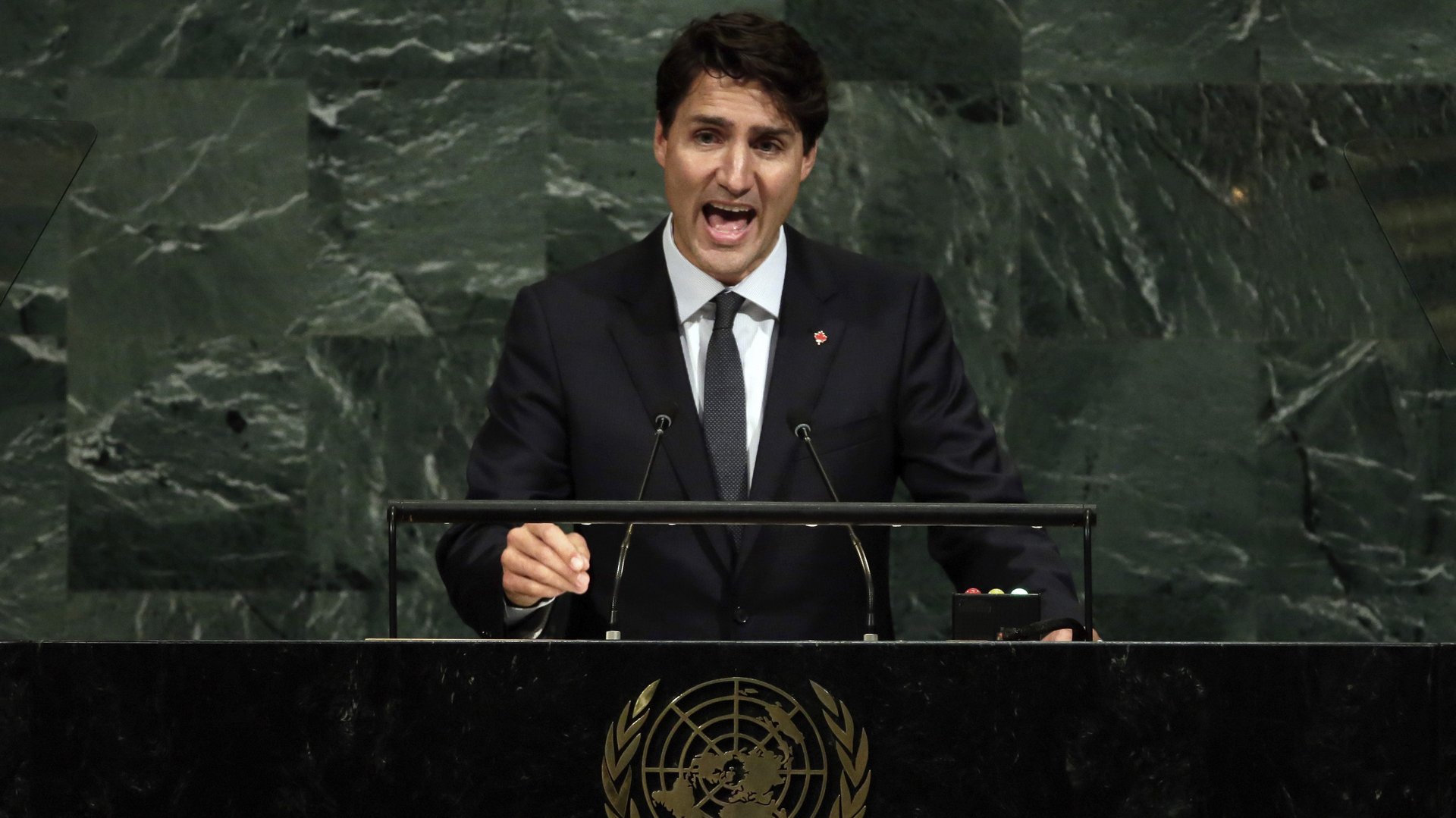Justin Trudeau spent his entire UN speech talking about human-rights abuses in his own country
Rich Western countries’ use of the UN as forum to lecture everyone else on human rights is one of the most well-worn—and valid—criticisms of the body.


Rich Western countries’ use of the UN as forum to lecture everyone else on human rights is one of the most well-worn—and valid—criticisms of the body.
Today (Sept. 21) Canadian prime minister Justin Trudeau did something radically different.
He stood before the UN general assembly and devoted his entire speech to his own country’s indigenous people and the abuses they have long suffered. “For indigenous peoples in Canada, the experience [of colonialism] was mostly one of humiliation, neglect, and abuse. They have been victims of a government which did not respect them, their traditions, their attributes, their governance, or laws,” he said.
While the 45-year-old Trudeau has been portrayed widely as the face of progressive politics since becoming prime minister, he is at times viewed with cynicism for his exceptional media savvy—occasionally dismissed as a photogenic lightweight, skilled in saying the right thing at the right time.
The Trudeau on display at the UN went all in. He didn’t merely nod to Canada’s First Nations people as an opening historical gambit so he could go on and tell other countries what to do now. Instead, Trudeau acknowledged that “for far too many indigenous people, this lack of respect for their rights continues today.” He then delineated the ways Canada’s 1.4 million indigenous people suffer, and outlined how his country is using UN development goals to address their plight.
Trudeau had made indigenous rights a part of his electoral campaign and was prime minister in 2015 when the Truth and Reconciliation Commission of Canada concluded the government was responsible for a deliberate effort to end the separate existence of aboriginal people and eradicate their culture. He officially recognized the abuse, offered an emotional apology and pledged to deliver on 94 calls to action. (Trudeau has recently been criticized for not following through with part of his commitment.)
At the UN, the contrast with other Western leaders was stark. EU and French leaders’ appearances this week could be boiled down to simple repudiations of US president Donald Trump’s aggressively nationalist views. Listening to Trudeau’s speech, you wouldn’t even know that Trump was around.
Trump addressed the UNGA by insisting that “in America, we do not seek to impose our way of life on anyone, but rather to let it shine as an example for everyone to watch,” and then proceeded to let the world know exactly what he thinks of it. Meanwhile, Trudeau openly acknowledged that Amnesty International calls the treatment of indigenous women in Canada “a human-rights crisis,” adding: “I want to tell you our story because I know that the challenges we have faced—and continue to face—are not unique in the world.”
Where Trump’s speech extolled America’s greatness and how it had improved under his watch, Trudeau’s focused on Canada’s weaknesses, on the fact that it needs to improve just like everyone else.
In a press conference afterward, Trudeau explained his choice of subject: “A number of times, in conversations over the years, when I’ve suggested that certain countries need to do better on their own human rights, on their own internal challenges, the response has been, ‘Well, tell me about the plight of indigenous people in Canada.’”
Beyond human rights, many from the global South say the UN perpetuates colonial power structures in too many ways. Western leaders normally do their best to avoid the discussion. Yet Trudeau proclaimed: “We are dismantling the old colonial bureaucratic structures and creating a new Department of Crown-Indigenous Relations and Northern Affairs.” (He didn’t, however, mention that that department is to be run by a white woman.)
The speech was, of course, outstanding PR, focusing heavily on a domestic issue Trudeau has long prioritized, and fitting perfectly into the warm, cuddly image he keenly cultivates. What’s more, his actions on indigenous rights certainly haven’t been as rosy and progressive as he made out. Despite all that, in a forum that often descends into jingoism and tirades, it is genuinely impressive for a Western leader to call his country “a work in progress” and openly admit “the mistakes we’ve made.”
Annalisa Merelli and Devjyot Ghoshal contributed to this report.